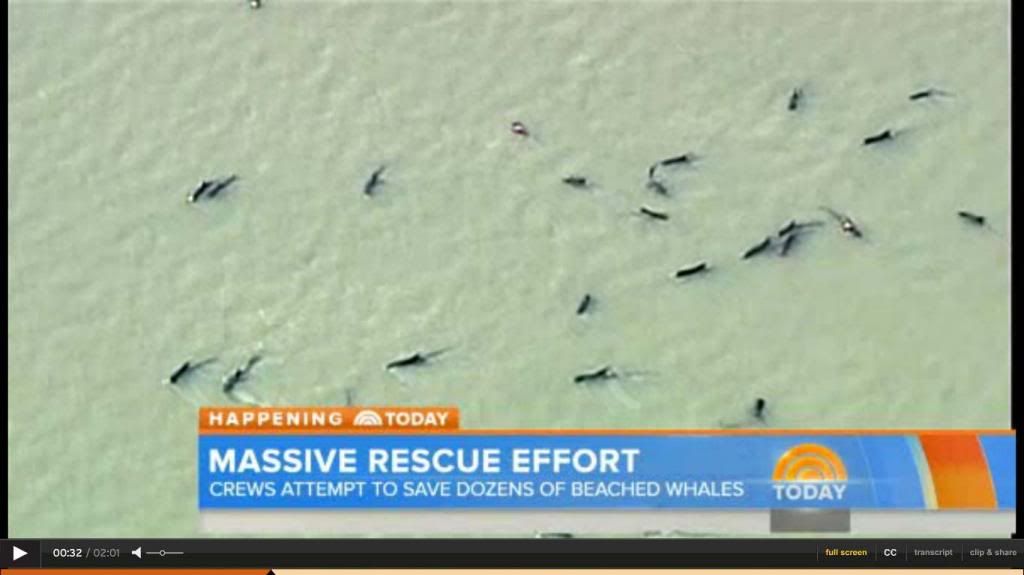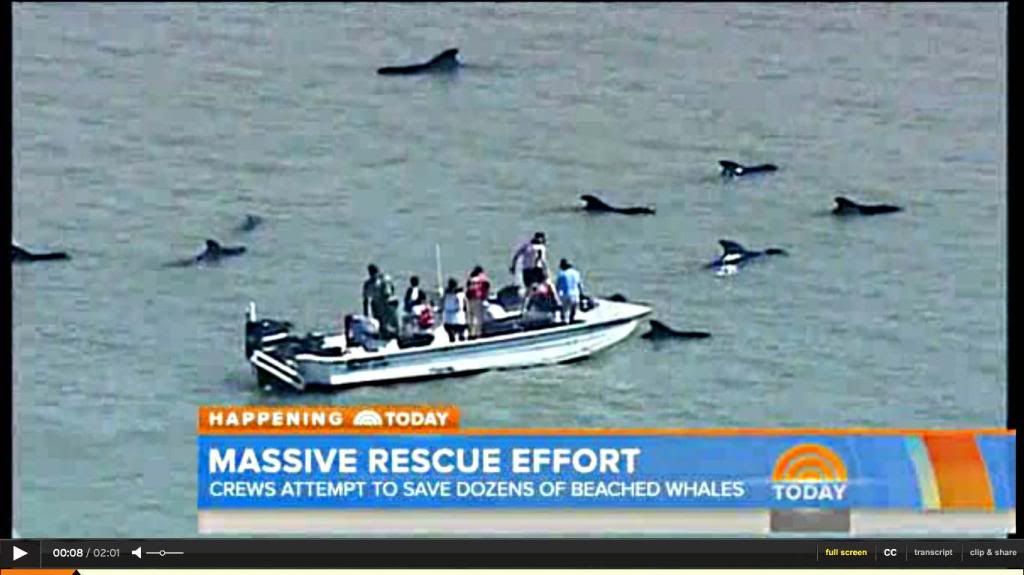How whales lose their way: Toxins, tides and other troubles
Video: A
race to save a group of stranded pilot whales in a remote part of the
Florida Everglades continues Thursday. NBC’s Mark Potter reports.
How common is it to have wayward whales?
"These sorts of strandings with pilot whales are not uncommon," said Phillip Clapham, who heads the Cetacean Assessment and Ecology Program at the National Marine Mammal Laboratory in Seattle. The most recent whale stranding in the Everglades was back in 1995, but about 20 whales were beached elsewhere on the Florida coast in 2011, and again last year.
This time around, 51 whales wound up stranded: As of Thursday afternoon, 11 whales were found dead or had to be euthanized. About 35 were alive and making their way offshore, said Blair Mase, a fisheries stranding coordinator for the National Oceanic and Atmospheric Administration. She said that left about five missing whales. At least some of those whales may have died and sunk beneath the surface.
What causes the whales to lose their way?
Lots of factors can play a part. "Every time you throw in one more element, you increase the chance of stranding," Clapham said.
For example, researchers say parasites or infections can confuse the whales' sense of navigation. Pilot whales can suffer from morbillivirus, a strain that's related to the virus implicated in this year's dolphin die-off. Clapham doubts that virus caused this week's strandings. Nevertheless, biologists in Florida have taken tissue samples from the 11 dead whales, and they'll be studying those samples for signs of toxins over the weeks and months ahead.
Human activity has the potential to confuse whales as well — perhaps through sonar or seismic disruptions, or interaction with fisheries. Those causes also seem unlikely in the Everglades case. The most likely factors are environmental: shifts in currents, changes in the underwater terrain, a turnabout in the weather, or perhaps the influence of tides.
Read More and Watch Video Here
..........

00:32
NPR
Some Stranded Whales In Fla. Moving Out To Sea
The Associated Press reports:
, the stranding of about 45 pilot whales was first noticed on Tuesday in a remote area of Florida's Everglades."Blair Mase, a fisheries stranding coordinator for the National Oceanic and Atmospheric Administration, said a Coast Guard helicopter found two pods of whales in about 12 feet of water, 'significantly north' of their previous location in Everglades National Park. The short-finned pilot whale is a deep-water species that cannot survive long in the shallows."
NPR's Greg Allen reports from Miami that more than 30 people and about 15 boats are involved Thursday in an ongoing operation to redirect the whales.
Read More Here
..........
NBC News
Whale rescue effort continues in Florida's Everglades as pods move to deeper waters
A pod of more than 30 stranded pilot whales have moved into deeper water. NBC's Mark Potter reports.
Pods
of 35 stranded pilot whales were moving into deeper waters of Florida’s
Everglades National Park, raising hopes for their survival, officials
said Thursday.Three pods were located nine miles north of their original location on the Gulf of Mexico side of the park and moving offshore, National Oceanic and Atmospheric Administration fisheries official Blair Mase said at a Thursday afternoon teleconference, adding that the animals were in 12 feet of water by midafternoon.
Mase said the whales may defy the odds and reach their normal deep-ocean range.
By Thursday afternoon, 11 whales had been found dead and five others were unaccounted for, according to Mase.
The whales had been stranded in a remote area of the park near Highland Beach, more than 20 miles from waters deep enough to support them.
Earlier in the day, the U.S. Coast Guard had spotted two pods of whales “significantly north” in 12 feet of water swimming offshore near Seminole Point, Mase said.
The movement was a “rare occasion” and an encouraging sign, Mase said. She said the organization was prepared for the worst as mass strandings are often difficult to reverse.
“They’re still out of their normal home range,” she said, adding that the whales may be suffering from dehydration and malnutrition.
"They need to be in deep water in order to feed. If we can’t get them out, they could begin to be starving themselves," said Linda Friar, spokesman for Everglades National Park.
Citing a similar mass stranding in the mid-90s, Mase said, “We did have animals strand in the park area and they split up and groups were further south, but they all ended up stranding eventually.”
As a part of the new rescue efforts, teams from NOAA, the National Park Service and state wildlife organizations used noises, including aluminum pipes and engines, in an attempt to steer the whales away from the shallows.
“This particular area is extremely unique, it’s not herding them out of a lagoon,” Mase said early Thursday. “We’re herding them miles and miles. It’s very tricky.”
Read More and Watch Video Here
..........









No comments:
Post a Comment
Hello and thank you for visiting my blog. Please share your thoughts and leave a comment :)